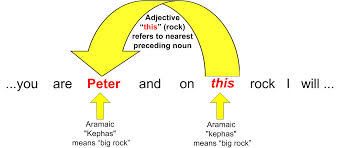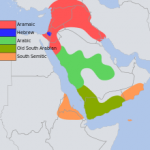On This Kephas I Will Build My Church
I was recently in attendance at Tom Price’s lecture titled “Roman Catholicism”, hosted by Indian Hills Community Church in Lincoln, Nebraska. Indian Hills Community Church is well known for its distaste for Catholicism. Mr. Price, a prominent member of Indian Hills Community Church (I think he said he was Deacon), tried to use the Greek translation of Peter’s name in an effort to undermine Peter’s selection as the first leader of the Church (See Matthew 16:13-19). At the end of the talk, I raised my hand to offer the fact that Christ was speaking Aramaic in Matthew 16, therefore, the Greek word for Peter’s name is irrelevant. Mr. Price said he had not heard that Christ spoke Aramaic to his apostles, but dismissed my point by saying that the rest of Scripture shows that Peter was not the rock on which the Church was built. He then moved on to other questions from the audience.
After the talk, Mr. Price approached me and again repreated that the rest of Scripture shows that Peter was not the rock. Mr. Price was very cordial and courteous to me throughout our conversation, which I appreciated, but that didn’t cause me to forego offering more information to him. I pointed out that there is a lot of Scriptural evidence that Peter was and is the rock in Matthew 16. I pointed out:
- Whenever the apostles are listed, Peter is always first;
- Peter is mentioned by name more often than all the rest of the apostles combined;
- Peter is the only apostle who had one-on-one conversations with Christ during his public ministry;
- Right before the Passion began, Jesus specifically prayed for Peter’s strength to hold the apostles together. I discuss these things much more thoroughly in a blog penned several years ago and another blog that discusses the early Church Fathers.
At that point, Mr. Price said there were some other people in the room he needed to speak with and invited me back to his class the following week.
If you hear someone talking about the Greek translation of Matthew 16, don’t dismiss it as too difficult to understand, just send them a link to this blog.
It is common for non-Catholics to argue that when Matt 16:18 is taken back to Greek, it does not mean that Peter is the rock on which Christ built His Church. Such critics suggest that Christ was building His Church on Peter’s confession, some other “rock” or that Peter was simply a little pebble or that Christ certainly did not mean that he was building His Church on a little pebble.
Let’s consider the language possibilities. If Christ was speaking ancient Greek, which is highly unlikely, he said he would build his Church on a pebble, meaning Peter. This is certainly a very good analogy for what actually happened as Peter was just one small man (familiar with mistakes) and the Church has lasted for 2000 years and consists of billions of billions of people since that day making it enormous compared to one mere human. Additionally, the mission of the Church is way beyond the capability of even the most skilled and ambitious humans ever known.
We look at people like Henry Ford, Thomas Edison, Albert Einstein, etc…, and frequently honor the enormous achievements of which few are capable. Peter’s leadership eclipses all the great inventors and leaders in history (combined) when you consider the size, longevity and impact of the Church. However, Peter alone, did not possess the capability of setting the course that the Church has kept for 2000 years. Therefore, it is unreasonable to dismiss Peter as the chief apostle, simply because he was a flawed man.
However, there is more than one dialect or form of Greek. Many scholars tell us that the Greek used by the early Christians was Koine Greek which doesn’t distinguish between large and small rocks.
But scholars, historians and Christian leaders tell us that Jesus wasn’t speaking in Greek in Matt 16:18 and the Gospel of Matthew probably wasn’t originally written in Greek. For this reason, I am confident in believing that Jesus was calling Peter the rock and not a little pebble.
Historians believe Jesus was speaking Aramaic in Matthew 16 and that Matthew was written in Aramaic. They conclude this because Aramaic was the common spoken language of the Jews in and around Galilee and Jerusalem at the time of Christ’s public ministry. We know this from the writings of the earliest Christians such as Irenaeus, Eusebius and Papias, who all wrote about the language between 130 and 250 as well as the majority of historians who have devoted their lives to the study of the language and history of early Christianity. Lesser known figures also have preserved writings that support Christ’s use of Aramaic. Flavius Josephus was a contemporary of St. Paul, who lived from 37 to circa 100 AD. He explained that he wrote in Aramaic because the people who could read, were most fluent in Aramaic. It stands to reason that a person reading aloud to others would choose to read it aloud in Aramaic, so that the people could hear it in the language they best understood.
Historians have developed the above map to show the preferred languages and their regional use around the time of Christ. The pinkish/red color shows that Aramaic was the language of the Holy Land during Christ’s public ministry.
You may ask why the language matters.
In Greek, the word rock had a gender and it was feminine. Therefore, you get the unintended mistranslation of Peter’s name from Rock to pebble on to which some of the non-Catholics grasp. But in Aramaic, nouns don’t have gender. Therefore, Jesus, speaking in Aramaic and Matthew, writing in Aramaic, would have used the word Kephas for Peter and rock, consistent with the 2000 year old Catholic teaching.
You may then ask, “What if Jesus was speaking Hebrew?”
If Jesus was actually speaking Hebrew and not Aramaic, the Catholic teaching is still supported. The word for rock is tsur, which is a masculine noun, suitable for use as a man’s name as well as for stone. “You are Tsur (Rock) and on this Tsur (Rock) I will build my Church.”
In addition to the above facts, there are others who have done much more significant research and study of this issue. Scholars and authors such as Fr. Sidney Griffith, Geoffrey Bromley, Joachim Jeremias, Alan C. Myers, Maurice Casey, Fr. Joseph Fitzmyer, Charles Cutler Torrey, D.A. Carson, Gustaf Dalman, Matthew Black, John Romer, Oscar Cullman, Willis Barnstone and Seth Swartz all agree that Jesus Spoke Aramaic and that the common people of the area had adopted Aramaic as the common language. Prominent non-Catholic preachers such as R.C. Sproul and John MacArther (no friends to Catholicism) also agree that Christ spoke Aramaic to his apostles in various articles found on their websites.
Finally, we have some direct quotes from Christ, which maintained the Aramaic origin. The most familiar to you will probably be Matthew 27:46 – Around the ninth hour, Jesus shouted in a loud voice, saying “Eli Eli lema sabachthani?” which is, “My God, my God, why have you forsaken me?” (see also Mark 15:34) But there are others, such as: Mk 5:41; Jn 1:42; and various other verses in which names are given in Aramaic, not Greek, Hebrew or otherwise.
Non-Catholic scholars sometimes use Gerhard Kittell’s Theological Dictionary of the New Testament when doing biblical research. It is in this book that Oscar Cullman writes:
“The obvious pun which has made its way into the Greek text . . . suggests a material identity between petra and Petros . . . as it is impossible to differentiate strictly between the two words. . . . Petros himself is this petra, not just his faith or his confession. . . . The idea of the Reformers that he is referring to the faith of Peter is quite inconceivable. . . . For there is no reference here to the faith of Peter. Rather, the parallelism of “thou art Rock” and “on this rock I will build” shows that the second rock can only be the same as the first. It is thus evident that Jesus is referring to Peter, to whom he has given the name Rock. . . . To this extent Roman Catholic exegesis is right and all Protestant attempts to evade this interpretation are to be rejected. (Theological Dictionary of the New Testament, vol. 6, Eerdmans, 98–99, 108)”
While there is still room for disagreement, the evidence heavily favors the Catholic position on this issue.
Some non-Catholics still try to disprove that Christ spoke in Aramaic by pointing out the fact that no Aramaic originals of the Gospels exists. They surmise that the Catholics are arguing from silence because we can’t point to an original Gospel of Matthew written in Aramaic.
As you know, the original texts of the Gospels have been lost for centuries and were probably destroyed by those persecuting the Catholics or lost in fires, floods and other disasters. The oldest transcripts we have are all copies and are in many languages, including Greek. But this does nothing to disprove the Catholic belief that Christ spoke Aramaic and the Gospel of Matthew was written in Aramaic. The argument that the original text was in Greek is just an argument from silence and the non-Catholic’s position has none of the other evidence to support it.
So what does this mean? It means that those who try to explain away the clear interpretation of Matt 16:18 by suggesting you don’t know Greek, are parroting an old and poorly conceived anti-Catholic slander.






The context of this question was who men were saying Jesus was. (v. 13). Jesus was not asking Peter alone who men said He was. but “His disciples.” When the Lord “said to them [not just Peter], who do you say that I am?” Peter gave the right answer. “You are the Christ, the Son of the living God.” And the confession or fact of His divine Sonship was the rock the enabled Jesus to build His church. And He reiterated that idea in verse 20 when He told them to tell no one He was the Christ. The context demands that the rock be the fact that Jesus was the son of God. It had nothing to do with Peter except that he gave the right answer. And when Jesus told him that flesh and blood had not revealed that, but His Father, He meant that Peter did not get his answer from humans, but from the evidences that Jesus was the divine Son of God. Suggesting that Peter is the rock is not only theologically wrong, but destroys the very purpose in Jesus even asking the question about who He was! Consider Jesus as the “rock” from Matt. 7:25, Luke 6:48, Romans 9:33, I Cor. 10:4, I Peter 2:8.
Roger: Thanks for reading some of my blog. Unfortunately, you go to herculean lengths in your effort to misinterpret Scripture. Matthew 16:18-19 not only shows Peter as the leader of Christ’s Church, but every other occasion on which the Bible deals with the leadership of the apostles and the apostolic Church, Peter is shown to be the leader (which I deal with extensively in this blog). This is not inconsistent with the fact that Jesus is the Rock, but as God, Jesus has the authority to appoint His successor, which is St. Peter, followed by St. Linus, St. Cletus, St. Clement I, etc…
Bob S.
Biblical scholars also point out that the syntax of Mt16 resembles Aramaic syntax, not Koine Greek syntax. This is further evidence that Jesus was not referring to a pebble, but a rock.
This passage harkens back to Isaiah 22:22 where the steward receives authority symbolized by keys. Jesus is imparting authority again symbolized by keys.
Great points Mark!
I use to believe that Jesus referred to build his Church on the Rock according to the revelation of Peter until i understood that Peter means a movable Rock. Christ will not infeer to build His church on a movable rock certainly but a firm one (Petra- unmovable rock which is Christ) So on the revelation that Christ is the son on God is what The church is built on. I am a body of the church and with me being built up daily, i become strong to withstand the devices of the adversary so the gates of hades shall Not prevail against me in Jesus Name. We are all as Christians being built if we allow ourselves to be built. I was truly blessed with this revelation..it is absolutely liberating. God bless you all
Thanks for the comment Barbs. However, neither Scripture, nor 2000 years of Christian scholarship support your interpretation. As I write in my blogs, it is not the definition of Petra which matters because Petra is Greek and Christ was speaking Aramaic. Therefore it is the definition of Kepha or Cephas which is relevant. But even that definition is not definitive because we not only have Christ’s statement in Matthew 16:18-19, we have it prefigured in Isaiah 22 and we have numerous passages in the New Testament which support the Catholic interpretation and refute your personal interpretation. But even if that is not persuasive to you, maybe you can provide some Scripture to support your interpretation. For instance, you could provide Scripture for your belief that Christ would not say he was going to build His Church on a moveable rock. Secondly, you could point to verses which say the gates of Hell will not prevail against you. Finally, you could provide Scripture which says that an individual is a “body of the Church”, as opposed to being a member of the body of Christ, who is the Church.